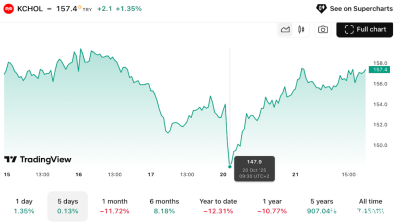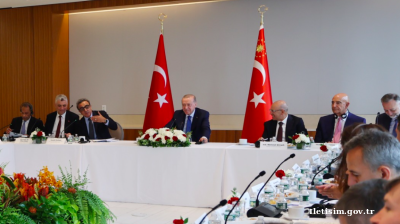If ever a country needed an International Monetary Fund (IMF) supported economic adjustment programme, it has to be Recep Tayyip Erdogan’s Turkey.
So says Desmond Lachman, a senior fellow at the American Enterprise Institute conservative think tank, who served as a deputy director in the IMF’s policy development and review department and the chief emerging market economic strategist at Salomon Smith Barney.
In an opinion piece for The Hill, Lachman says: “It is not simply that his country has sky-high inflation, a gaping external current account deficit and a currency in seeming free fall. It is that the country’s foreign exchange reserves are depleted and Erdogan’s past economic policy mismanagement has left the country with a major investor confidence deficit.
“The IMF could help the country’s president, who won reelection late last month, set his economy in order, not least by helping to prevent a full-blown foreign exchange crisis. It could do so by boosting confidence through provision of desperately needed external financial support and by giving its seal of approval to a credible economic adjustment program. At a political level, it could provide Erdogan with a useful scapegoat for the painful economic medicine that Turkey now has no real alternative but to take.”
The risk of Turkey suffering a full-blown balance of payments (BoP) crisis has been tracked since the country’s currency crisis in 2018. Erdogan has always managed to pull the country back from the edge, by sourcing money from friendly countries or hiking rates sharply. As bne IntelliNews observed on May 29: “The external balance and a lack of FX remain the regime’s Achilles heel. A failure to secure fresh FX supplies could at any time trigger a severe balance of payments shock.”
A BoP crisis is a rather serious matter that is worse than a banking or currency crisis. Turkey had one in 1958 and a harder one in 1979. A military coup followed each crisis.
The difficulty, however, for those recommending an IMF bailout for Turkey is that Erdogan rose to power two decades ago promising to build an economy that would never again require the government to go grovelling to the Fund.
To extricate Turkey from its economic nightmare, Erdogan has brought back Mehmet Simsek, a market-friendly politician who is a former regional chief economist of Merrill Lynch, for a second stint as his finance minister. However, Simsek has reportedly told Erdogan that rescuing the economy will require a return to orthodox economics, such as hiking rates to fight inflation.
The excruciating difficulties Simsek had in persuading Erdogan to give him a shot at administering the required medicine to the economy is described in an account published on June 13 by Middle East Eye.
Lachman suggests that working with the IMF is the only answer for Turkey. In his opinion piece, he adds: “Turkey finds itself in dire economic straits at a challenging time for the global economy. Despite being artificially suppressed, inflation is still some 45 percent, while the external current account deficit has widened to 6 percent of GDP. Meanwhile, the central bank’s international reserves are dangerously low, interest rates are highly negative in inflation-adjusted terms and the government is on the hook for a mountain of bank deposits that it guaranteed against exchange rate depreciation. As if this were not enough reason for deep concern, the country’s currency has lost a further 20 percent of its value in the two weeks since the second round of the election.
“In these circumstances, the last thing that Turkey needs is another half-baked economic adjustment program. To be sure, Erdogan’s recent appointment of Mehmet Simsek, a well-respected and experienced economist, as minister of finance is a welcome first step in restoring confidence. So too is the recent move to a more market determined exchange rate. However, if these moves have any hope of succeeding, those initial steps need to be followed by the more difficult task of pursuing an appropriate monetary and fiscal policy.”
Lachman concedes that “for Erdogan to make an abrupt economic policy U-turn and go to the IMF will be a politically difficult pill to swallow. However, given his numerous past failed efforts in going it alone to adjust the economy, he would seem to have no realistic alternative but to go cap in hand to the IMF for its financial assistance and seal of approval.
“Rudi Dornbusch, the late MIT economist, famously said that a currency crisis takes a much longer time coming than you think, and then it happens much faster than you would have thought. He also is said to have likened the task of halting a currency crisis to that of a hunter with only one bullet in his rifle being faced by a charging tiger. If the hunter does not get his shot right the first time, he will not have a second chance.
“Now that Erdogan has been elected for another term, we have to hope he gets the present currency crisis under control the first time, by calling in the IMF for an economic adjustment program. However, given his past highly eccentric and erratic economic policy performance, I would not recommend betting the farm on his doing this.”
MEE’s account of the exchanges between Erdogan and Simsek that eventually led to the latter agreeing to return as finance minister tells how the president was left feeling “uncomfortable” when Simsek delivered a presentation that “gave the president an exhaustive picture of the state of the nation”.
Sources said Erdogan insisted Simsek’s words alone were enough, but Simsek retorted: “You have to see all the data and understand what is going on yourself.”
Simsek, reported the article, “demanded a broad overhaul in the Turkish economic structure, one that would directly contradict Erdogan’s core unorthodox monetary policy”.
It added: “Nonetheless, Erdogan tried to stand his ground on [not raising] interest rates, which he believes are un-Islamic, something that goes against the core message of the Quran. Simsek then tried to convince the president that there was no ignoring the world we live in.”
People close to Simsek also told MEE that soon after taking office, the new finance minister disclosed to his circle that Turkey’s economic situation was worse than he had imagined.
There were concerns among international investors and local economists that Erdogan could fire Simsek in the near future “if an aggressive interest rate hike slows growth and costs jobs ahead of next year’s municipal elections… [when] Erdogan is determined to recapture Istanbul, Ankara and Antalya from the opposition”, added the publication.
Features

Andaman gas find signals fresh momentum in India’s deepwater exploration
India’s latest gas discovery in the under-explored Andaman-Nicobar Basin could become a turning point for the country’s domestic upstream production and energy security

The fall of Azerbaijan's Grey Cardinal
Ramiz Mehdiyev served as Azerbaijan's Presidential Administration head for 24 consecutive years, making him arguably the most powerful unelected official in post-Soviet Azerbaijan until his dramatic fall from grace.

Ambition, access and acceleration – Uzbekistan’s Startup Garage opens free academy for entrepreneurship
Aim is to train 50,000 young founders by 2030.

Ukraine’s growing energy crisis promises a cold and dark winter
Since the summer, Kyiv has changed tactics. Given the almost complete failure of Western oil sanctions to curb Russian oil exports, it has been targeting Russian oil refineries. The Kremlin has struck back, targeting Ukraine's power system.




